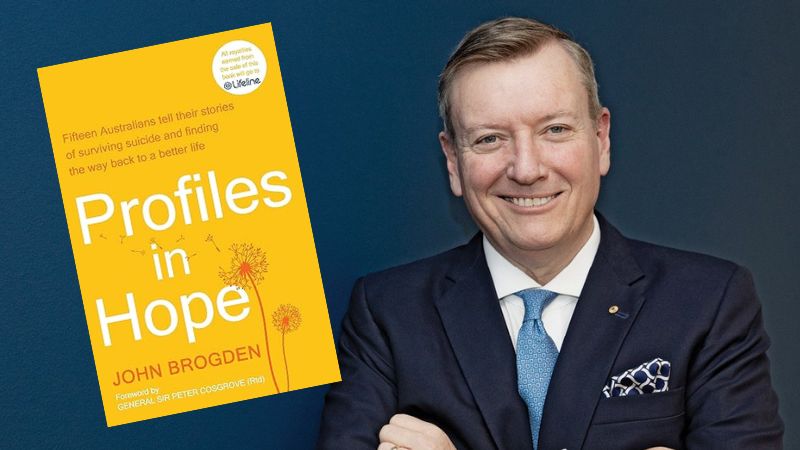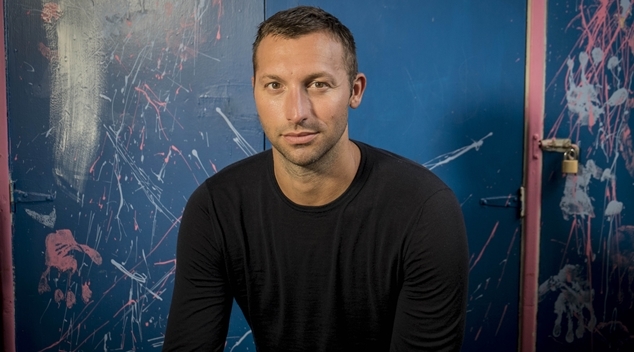Estimated reading time: 6 minutes
Every day, nine Australians take their own lives. Nineteen years ago, John Brogden came very close to adding his name to these statistics. But John survived and, since his recovery, he has become a passionate voice for mental health and suicide prevention.
Warning: This story has details of suicide which might be distressing to some readers. For 24-hour crisis support and suicide prevention call Lifeline on 13 11 14. For Australia-wide LGBTQI peer support call QLife on 1800 184 527 or webchat.
Now he is the Honorary President of LifeLine International. Personally and professionally, Brogden knows how urgent it is to talk openly about suicide, and to provide people in despair with a way back when they are at their lowest point.
Giving hope to those who think there is no other answer is critical. John is living proof that it’s possible to survive and thrive.

Now, in a new book Profiles in Hope, he has gathered together some incredible Australians to tell their stories.
With contributions from people such as James Packer, Jacqui Lambie, Tom Boyd, Layne Beachley, Preston Campbell and Ian Thorpe, alongside powerful stories of ordinary Aussies, these deeply personal accounts of survival, recovery and lives of purpose are described as a balm for the vulnerable and a beacon of light to those struggling.
This book is for those at risk and for the people who love them and don’t know how to help. All of the proceeds from the book go to Lifeline.
The first story that Brogden shares is his own. In 2005 the politician’s world came tumbling down. As scandal saw him resign as the New South Wales opposition leader, his hopes of one day becoming the state’s premier shattered.
At 36 he was at the time the youngest person to lead a political party in Australia. He’d always dreamed a political career but had never really thought of life post-politics, and nor did he expected to come so suddenly.
“I was depressed, disgraced, ashamed and sorry for what I had done.” Brogden shares, “I had brought great underserved shame and embarrassment to my family, friends, and supporters.
Brogden made the decision to end his life. He felt it would end the shame and burden and make the lives of everyone he loved easier. “Thank God I survived.” he says.
Many would argue that Brogden has achieved far more in his post-political life than during his time in parliament. He’s gone on the be the Chair of Lifeline, and Lifeline International, raised millions of dollars for suicide prevention and shared his experiences with hundreds of thousands of people.
He acknowledges that suicide ideation will always be with him, but he like all the people interviewed in the book have been on a journey and developed strategies that work for them.
“Suicide is easily misunderstood.” Brogen writes. “Often it is an act of impulse. We can live our lives with good mental health but, in a moment of crisis, come to a place where we attempt suicide. Fifty per cent of people who die by suicide have never seen a mental health professional.”
Brogden shares that when he reflected back on his life, he realised that he had always lived with suicidality. He also describes Australia’s rate of suicides as “stubborn”, as despite many different strategies, they remain at an unacceptably high level.
Removing the stigma around conversations is key, as is making sure people know the facts, where they can get help and most importantly – it’s a challenge taken on by many Australians, but everyone has an important role to play.
Brogden provides a perspective noting that in 2022 there 1,200 road deaths in Australia, and the following year there was four shark deaths across the country. The suicide rate is 3,300 and each year 65,000 people attempt suicide.
Stories about suicide don’t lead news bulletins or fill the front pages of newspapers. While Australia has strict guidelines for journalists on reporting details of individual cases, it shouldn’t stop us talking about the issues, practical strategies for people experiencing suicidality, or support for friends and family who lose a loved one to suicide.
Working through the demographics the author shares the groups which are most at risk, including men between forty and fifty-four years of age, Aboriginal and Torres Strait Islanders, defense personnel and veterans, and members of the LGBTIQA+ communities, especially people who transgender.
The powerful and honest stories within the book are easy to read, presented in a simple question and answer format, each participant enlightens us with their experiences and knowledge. You can read them all in one sitting, or pick and choose the stories which might resonate with your own life.

Layne Beachley and Ian Thorpe give an experience from a sporting life. Beachley shares the challenges she faced growing up when she discovered she was adopted, and Thorpe talks about the pressure on him over his sexuality.
Matthew Caruana talks about the effect religion, body image and peer pressure had on his life, and how his world is remarkably different today than when he attempted to take his own life.
Journalist Davina Smith shares her experiences of anxiety and being a new mother. Indigenous Australian Ben Farinazzo speaks about his experiences of being in the military, as does Senator Jacqui Lambie.
Rugby player Ellia Green gives us insight into the experiences of being transgender, and shares stories about how family life and culture can play a big role. While farmer Peter Moloney talks about living life on the land and away from much needed support services.
At the beginning of the book Brogden shares a quote from another disgraced politician, former US President Richard Nixon, who said; “Only if you’ve been in the deepest valley can you ever know how magnificent it is to be on the highest mountain.”
Profiles in Hope is an excellent way to start charting a course to the top of the next mountain.
Do you need some support?
If you are struggling with anxiety or depression, support and counselling are available from:
QLife: 1800 184 527 / qlife.org.au (Webchat 3pm – midnight)
QLife are a counselling and referral service for LGBTQIA+ people.
DISCHARGED: info@discharged.asn.au / discharged.asn.au
Discharged is a trans-led support service with peer support groups for trans and gender diverse folks.
Lifeline: 13 11 14 / lifeline.org.au
Beyondblue: 1300 22 4636 / www.beyondblue.org.a





